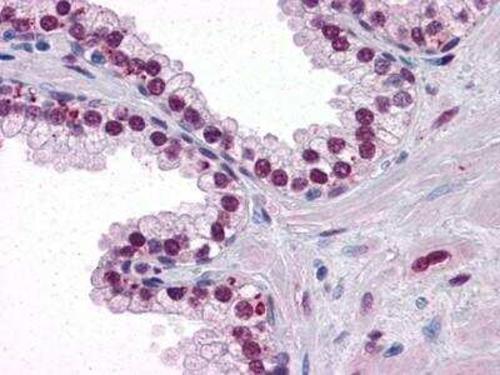Androgen Receptor (AR) Mouse Monoclonal Antibody [Clone ID: 2H8]
Frequently bought together (2)
Transient overexpression lysate of androgen receptor (AR), transcript variant 1
USD 605.00
Other products for "Androgen Receptor"
Specifications
| Product Data | |
| Clone Name | 2H8 |
| Applications | IHC, WB |
| Recommended Dilution | Western Blot: 1:500-1:2000, Immunohistochemistry-Paraffin: 1:200-1:1000, ELISA: 1:10000, Immunohistochemistry: 1:200-1:1000 |
| Reactivities | Human |
| Host | Mouse |
| Isotype | IgG1 |
| Clonality | Monoclonal |
| Immunogen | Purified recombinant fragment of human Androgen Receptor expressed in E. coli. [UniProt# P10275] |
| Formulation | PBS, 0.03% Sodium Azide. Store at 4C short term. Aliquot and store at -20C long term. Avoid freeze-thaw cycles. |
| Concentration | lot specific |
| Purification | Ammonium sulfate precipitation |
| Conjugation | Unconjugated |
| Storage | Store at -20°C as received. |
| Stability | Stable for 12 months from date of receipt. |
| Predicted Protein Size | 110 kDa |
| Gene Name | androgen receptor |
| Database Link | |
| Background | Androgens have a broad range of effects on the appearance and maintenance of male secondary sexual characteristics. Like other members of the steroid superfamily, the Androgen Receptor (AR) consists of an amino terminal modulating domain, a central DNA binding domain, a hinge region and a carboxy terminal ligand binding domain. The Androgen Receptor is a 110 kDa androgen-dependent transcription factor that is a member of the steroid/nuclear receptor gene superfamily. The AR signaling pathway plays a key role in development and function of male reproductive organs, including the prostate and epididymis. AR also plays a role in nonreproductive organs, such as muscle, hair follicles, and brain. Abnormalities in the AR signaling pathway have been linked to a number of diseases, including prostate cancer, Kennedy's disease and male infertility. The PI3K/Akt signaling pathway plays an important role in regulating AR activity through phosphorylation of AR at Ser213/210 and Ser791/790. Growth factors or cytokines may induce phosphorylation of AR through the PI3K/Akt pathway. Activation of the PI3K/AKt pathway is thought to have a survival role in prostate cancer by protecting cells from apoptosis. |
| Synonyms | AIS; AR8; DHTR; HUMARA; HYSP1; KD; NR3C4; SBMA; SMAX1; TFM |
| Note | This Androgen Receptor (2H8) antibody is useful in Western Blot, Immunohistochemistry on paraffin-embedded sections and ELISA. |
| Reference Data | |
| Protein Families | Druggable Genome, Nuclear Hormone Receptor, Transcription Factors |
| Protein Pathways | Oocyte meiosis, Pathways in cancer, Prostate cancer |
Documents
| Product Manuals |
| FAQs |
| SDS |
{0} Product Review(s)
0 Product Review(s)
Submit review
Be the first one to submit a review
Product Citations
*Delivery time may vary from web posted schedule. Occasional delays may occur due to unforeseen
complexities in the preparation of your product. International customers may expect an additional 1-2 weeks
in shipping.






























































































































































































































































 Germany
Germany
 Japan
Japan
 United Kingdom
United Kingdom
 China
China







